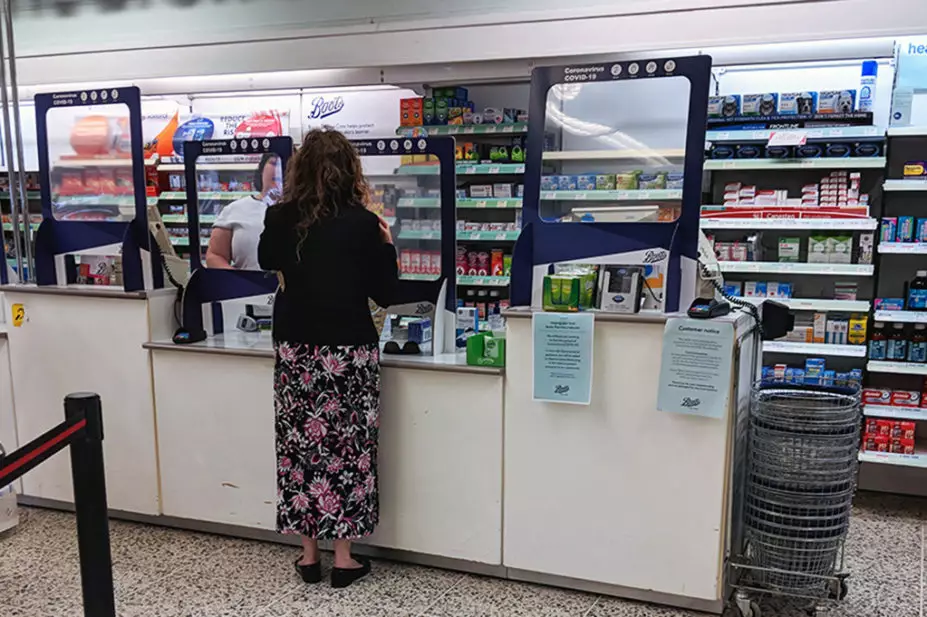
Shutterstock.com
Just over 20% of patients referred to pharmacies through the GP ‘Community pharmacist consultation service’ (CPCS) during the scheme’s first five months were sold a medicine as well as receiving medical advice, figures published by NHS England show.
In response to a freedom of information (FOI) request sent by The Pharmaceutical Journal in April 2021, NHS England said GPs referred a total of 6,992 patients to community pharmacies in the first five months of the CPCS, between 1 November 2020 and 1 April 2021.
NHS England, which sent its FOI response on 25 January 2022, did not provide data on the number of GP practices that had signed up to the CPCS. However, its data did show that 10,841 community pharmacies were receiving CPCS referrals by 1 April 2021.
The service was rolled out nationally as an advanced service on 1 November 2020 and pays pharmacists £14 for each ‘completed’ referral.
A referral is considered ‘completed‘ when a pharmacist provides: advice to the patient or advice plus an over-the-counter medicine; a referral to a local minor ailments service; a referral to another locally commissioned service, such as a patient group direction; a non-urgent referral to another service, such as back to their GP practice; or an urgent referral back to their GP or to a hospital emergency department.
Of the 6,992 total CPCS referrals, NHS England’s response said that 2,119 patients received advice only; 1,407 “received advice and were sold a medicine by a community pharmacist”, 938 were referred into an appropriate locally-commissioned NHS service; and 120 were referred into a local pharmacy minor ailment service (see Table).
The response also noted that 1,096 patients “received a non-urgent signposting to another service and/or primary care healthcare professional, including patient’s GP practice”, while a further 492 patients were urgently escalated back to their GP practice.
Gareth Jones, the National Pharmacy Association’s director of corporate affairs, said: “These GP CPCS patient outcomes once again demonstrate the value of community pharmacy in delivering care as part of the primary care team.
“We believe that dialling up the usage of GP CPCS is one of the most immediate and tangible ways of easing the strain on our general practice colleagues and the whole health system.”
In October 2021, health secretary Sajid Javid said that he was asking his department “to work with the NHS” and look into a scheme for pharmacies in England that would operate in a similar way to the NHS ‘Pharmacy First’ service in Scotland.
Then, on 20 January 2022, in its response to a different FOI response, the Department of Health and Social Care inferred that government policy relating to the launch of a national minor ailments service for community pharmacy is being developed.
Through Scotland’s ‘NHS Pharmacy First’ scheme, pharmacists can offer free advice, treatment and referrals to patients presenting with minor conditions and supply treatment for certain conditions, without the need for a patient to visit their GP first.
In written evidence published on 12 January 2022 — which was submitted to the Health and Social Care Select Committee as part of its inquiry into the ‘Future of General Practice’ — the Pharmaceutical Services Negotiating Committee said this type of minor ailments scheme could save the NHS up to £640m per year in England.
| Consultation outcome | Number of referrals |
|---|---|
| Received only advice from a community pharmacist | 2,119 |
| Received advice and were sold a medicine by a community pharmacist | 1,407 |
| Were referred into a pharmacy local minor ailments service (MAS) | 120 |
| Were referred into an appropriate locally commissioned NHS service, such as a patient group direction | 938 |
| Were urgently escalated back to the patient’s GP practice | 492 |
| Were escalated to an urgent care setting, including A&E or 999 | 22 |
| Received a non-urgent signposting to another service and/or primary care healthcare professional, including patient’s GP practice | 1,096 |
| Did not have an outcome listed | 798 |
| Total GP referrals to community pharmacies to access CPCS between 1 November 2020 and 1 April 2021 | 6,992 |
Source: NHS England Freedom of Information response
What is the ‘Community pharmacist consultation service’?
The ‘Community pharmacist consultation service’ (CPCS) launched in October 2019, replacing the ‘NHS urgent medicine supply advanced service’ and ‘Digital minor illness referral service’ pilots.
In the initial phase of the services, patients were referred from NHS 111 to community pharmacies for free advice or an onward referral, with patients also able to pay for over-the-counter medicines.
In November 2020, the service was expanded to include referrals from general practice. However, uptake from GPs was slower than expected, with some local pharmaceutical committees receiving extra funding to increase GP referrals.
Leading GPs have explained that the low uptake was partly owing to a “bureaucratic” electronic referral system. As of October 2021, a report from the Royal Pharmaceutical Society (RPS) said that just 862 out of more than 6,500 GP practices in England were using the service.
The service has also failed to bring in the promised levels of funding. It had been expected to bring in around £4m in 2019/2020 and £9m in 2020/2021, with pharmacists paid £14 per consultation; however, the low uptake meant the projected funding levels were not reached.
Data published on 28 October 2021 by NHS Business Services Authority show that community pharmacies earned just £1.9m through the CPCS in 2019/2020 and £5.3m in 2020/2021.
Nevertheless, there could still be further opportunities for the number of referrals to increase as nine areas began piloting referrals from urgent treatment centres, such as emergency departments, in November 2021.
A review of NHS 111 referral pathways in January 2022 also saw the addition of three new condition types that could direct 275,000 more referrals to pharmacists each year.


